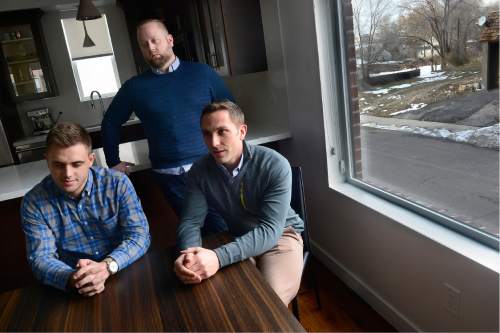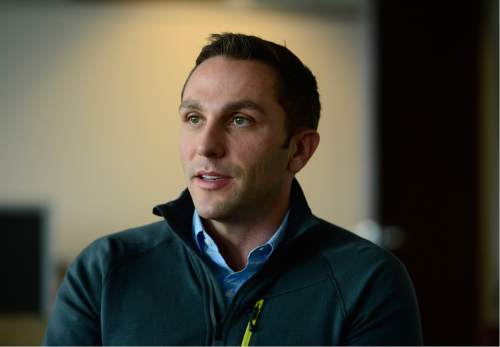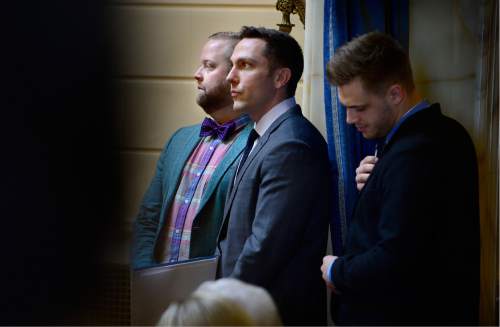This is an archived article that was published on sltrib.com in 2016, and information in the article may be outdated. It is provided only for personal research purposes and may not be reprinted.
A year and a half after two gay men were attacked outside their western Salt Lake City homes, prosecutors have filed misdemeanor charges against two Wyoming men in connection with the Christmastime 2014 beating — but not with a hate crime, as prosecutors had hoped.
Investigators worked "carefully and methodically" for well over a year to find a way to bring charges that would reflect the nature of the attack, but they came up short because the state hate-crimes law is ineffective, Salt Lake County District Attorney Sim Gill said.
"We did not leave any stone unturned," he said. "Unfortunately, this represents a category of crimes that continues to happen in our community for which we do not have an adequate measure of justice."
Court papers filed in Salt Lake City's 3rd District Court charge Eric Levi Johnson, 26, of Rock Springs, Wyo., and Chad Ryan Doak, 24, of Green River, Wyo., with one count each of class A and class B misdemeanor assault for the Dec. 21, 2014, incident near 300 West and 700 North.
Rusty Andrade and his friend Maxwell Christen were heading to their separate condominiums in the neighborhood after attending a party and were saying goodnight in the street when the two attackers came out of the dark, throwing punches and gay slurs, they told The Salt Lake Tribune in early 2015.
"We were jumped," Andrade said. "There was nothing on our part to instigate it."
Andrade and Christen were left bloodied, bruised and emotionally shaken.
Andrade suffered severe physical injuries from having his head slammed against the pavement. His injuries included cervical strain and head trauma, court records say. The attackers knocked out several teeth and bruised his ribs.
Andrade, an attorney, told The Tribune he was so traumatized by the attack that he had to sell his home and move to a city suburb. More than a year after the attack, he was still recovering physically, he said earlier this year. He continues to struggle emotionally.
If Johnson and Doak were convicted of the crimes as charged, they would face a possible maximum punishment of up to 18 months in the Salt Lake County jail.
Johnson and Doak initially fled the scene of the attack on foot, but they returned to look for a wallet one of them had dropped, court papers say. Salt Lake City police cited the men, who were not arrested.
A judge issued arrest warrants for them Wednesday.
Attempts to contact Johnson and Doak on Wednesday were unsuccessful.
"I'm glad they are charging something, but I think the public needs to understand it's not justice," Andrade said Wednesday. "I hope that our community will respond and understand that we need protections for people who are victims of these types of crimes."
The attack renewed an effort to rewrite Utah's hate-crimes law, but a proposal that might have strengthened it failed during the 2016 legislative session.
The bill would have applied equally to victims targeted on the basis of their race, religion, sexual orientation, gender identity or other classes.
Christen, who had lobbied lawmakers alongside Andrade in 2016, said he hoped the outcome would be different if a similar bill comes before the Legislature in 2017.
"These charges prove our current law is broken," he said. "It's frustrating."
Data collected on hate crimes in Utah since 1992 show that 49 percent of victims are targeted because of their race. Another 20 percent are targeted for their religion, 17 percent for ethnicity and 14 percent because of their sexual orientation.
Gill said there was no question that Andrade and Christen were targeted for their sexual orientation. Court papers say their alleged attackers called the pair a gay slur and made references to gay sex acts during the assault.
"We don't have to speculate about that," he said.
But under current Utah law, it is not a crime to target a person because of his or her sexual orientation — actual or perceived. The law also applies only to misdemeanor crimes, so there was no way to seek stiffer penalties or bump the charges up to a felony, Gill said.
His office asked federal prosecutors whether they could take the case, he said, but they also were unable to find a remedy in federal law.
A prominent Utah activist for gay rights expressed frustration on Wednesday, calling the charges a "slap on the wrist" and an inadequate response to a violent attack.
"This is exactly why we need a functioning hate-crimes law," said Troy Williams, executive director of Equality Utah. "Our current statute is broken. Prosecutors need the proper tools to bring justice to victims of hate and violence."
Twitter: @jenniferdobner







